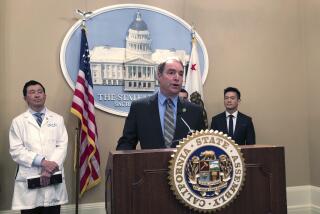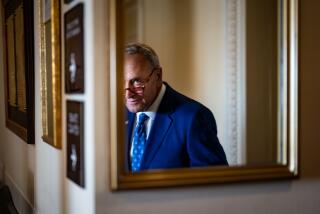Potent Tobacco-Control Legislation Picks Up Steam
- Share via
WASHINGTON — President Clinton and a wide swath of Senate Democrats are rallying around tough tobacco-control legislation that would raise the price of a pack of cigarettes by $1.50 over the next three years and deny the tobacco industry the protection from future lawsuits that it seeks.
The legislation, authored by Sen. Kent Conrad (D-N.D.) and slated for introduction today, signals the increasingly cold climate in Washington for the tobacco industry, which has sought smaller cigarette price increases and broad protection from future lawsuits.
If Conrad’s bill wins the support of most Senate Democrats, as its sponsors predict, it will have more backing than any comprehensive bill introduced so far to implement the mammoth settlement reached last year by the tobacco companies and the states. It also is the only proposal to win a White House endorsement.
Ultimately, without Republican support, the measure is unlikely to become law in anything resembling its current form. Still, it has injected momentum into a process that had appeared all but stalled.
“Conrad’s bill sends a pretty strong signal,” said Sen. John B. Breaux of Louisiana, a conservative Democrat who is often a bellwether of Senate politics. “To object to it is swimming upstream.”
Breaux said he was signing onto the bill, which would allow far greater federal regulation of tobacco products than the agreement reached last June by the states’ attorneys general and the industry.
Breaux’s comments were echoed by many of the Democrats emerging from the party’s weekly luncheon, where Conrad briefed his colleagues on the bill’s provisions.
But a few Democrats, including Sen. Dianne Feinstein of California, said they wanted to wait to see if a bipartisan bill emerged before backing Conrad’s proposal.
*
Several lawmakers, including Sen. John H. Chafee (R-R.I.) and Sen. Bob Graham (D-Fla.) are working on bipartisan legislation.
Conrad’s decision to give little ground to the tobacco companies in terms of future legal protections met with scant criticism from Republicans, suggesting they also are unlikely to support the limits on liability sought by the tobacco industry.
“I haven’t seen the votes for immunity,” said Sen. Don Nickles (R-Okla.), the majority whip.
White House officials voiced strong support for Conrad’s bill, but also made it clear they would continue to work with Congress on formulating proposals that the president could endorse.
“We think that this is a real step forward on the road to passing a bill,” said Bruce Reed, domestic policy director for the White House.
The Conrad proposal would:
* Settle the current state and local lawsuits against the tobacco industry and preclude federal lawsuits against the industry. But unlike the agreement forged between the state attorneys general and the industry, it puts no limit on future class-action lawsuits and no cap on the amount that the industry would have to pay out in a year.
* Increase the per-pack price of cigarettes by $1.50 (50 cents per year over the next three years). The state/industry agreement would increase the per-pack price by 62 cents over the next five years.
* Grant full Food and Drug Administration authority to regulate tobacco as a drug. The state/industry agreement would limit the FDA’s control in this area.
* Reimburse tobacco farmers $10 billion over the next five years to compensate for losses due to reduced sales of tobacco because of reductions in smoking. The state/industry agreement does not address this issue.
* Require a 67% reduction in youth smoking rates in 10 years. The state/industry agreement calls for a 60% drop.
The tobacco industry sharply criticized the major provisions of Conrad’s bill. And they said their opposition would imperil a key part of the state/industry accord--a provision to halt tobacco advertising and marketing aimed at young people.
Steve Duchesne, an industry spokesman, noted that such a prohibition could not be accomplished without the industry’s cooperation.
“Many of the advertising and marketing restrictions would be unconstitutional, and therefore could not be implemented unless the industry agreed to them,” he said.
Conrad’s measure would raise $78 billion over five years, more than Clinton’s budget proposal, which envisions a tobacco settlement that would raise roughly $65 billion over the same period.
“The strategy is to take as much from the [tobacco] industry as you can before you give to the industry,” said Mississippi Atty. Gen. Mike Moore, a key negotiator in the state/industry agreement.
He added that if Congress and Clinton move to toughen the agreement, the states’ attorneys general would be “all for it, but I think in the end you’re going to have to do something that the industry can find favor with.”
More to Read
Sign up for Essential California
The most important California stories and recommendations in your inbox every morning.
You may occasionally receive promotional content from the Los Angeles Times.












